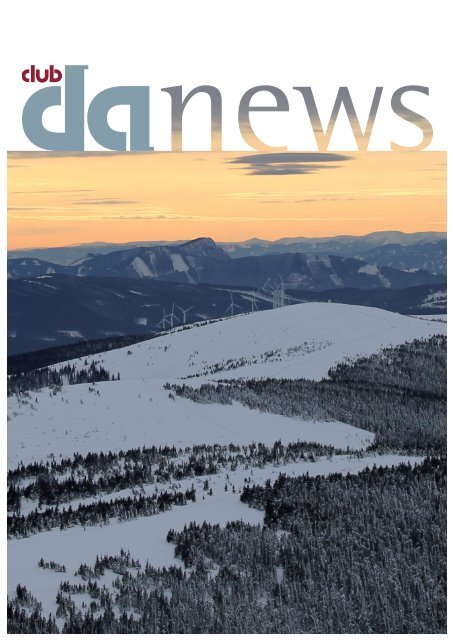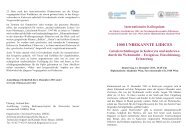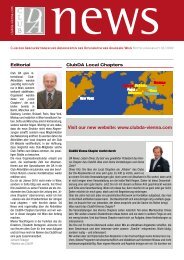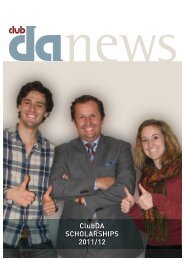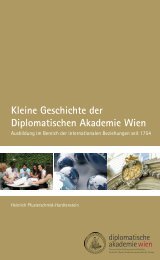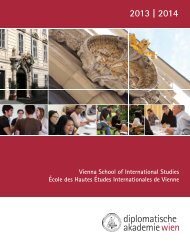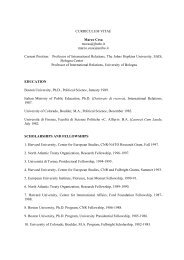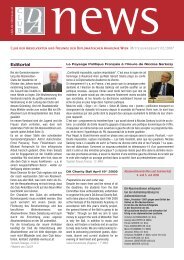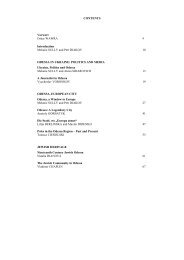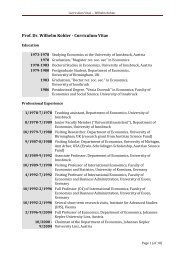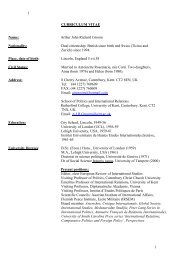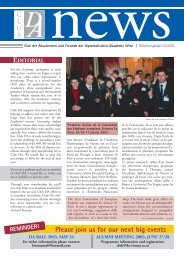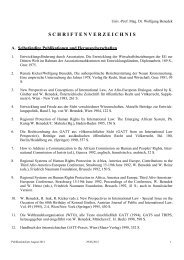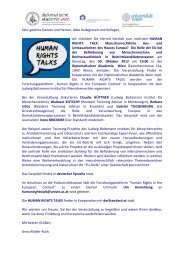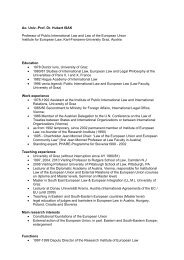An Interview with … dieter Kovar - Diplomatic Academy Vienna
An Interview with … dieter Kovar - Diplomatic Academy Vienna
An Interview with … dieter Kovar - Diplomatic Academy Vienna
You also want an ePaper? Increase the reach of your titles
YUMPU automatically turns print PDFs into web optimized ePapers that Google loves.
1/2013<br />
I n s i d e t h i s i s s u e<br />
Editorial. ............................................... 3<br />
Karin Nardo: a portrait. ..................................... 4<br />
Aditi Ramola: a portrait. .................................... 6<br />
Alumni Support for the Next Generation ........................ 8<br />
<strong>An</strong> <strong>Interview</strong> <strong>with</strong> <strong>…</strong> Dieter <strong>Kovar</strong> ............................. 10<br />
The <strong>Diplomatic</strong> <strong>Academy</strong> Charity Ball 2013 ..................... 15<br />
Chorus Musica Favorita. ................................... 16<br />
Peter Burwik. Dirigent und Leiter des „ensemble xx. jahrhundert“. .... 18<br />
ClubDA Warsaw Chapter ................................... 22<br />
12th DA Ski and Snowboard Championships. .................... 24<br />
Recent Alumni Meetings ................................... 25<br />
Studierende an der DA 2012/13. ............................. 27<br />
On the calendar ......................................... 29<br />
Imprint. ............................................... 29
EDITORIAL<br />
3<br />
Dear fellow Alumnae and Alumni!<br />
Early spring 2013 has brought along national<br />
and provincial elections in our neighbourhood!<br />
In Italy “cruel” measures against the state deficit<br />
have deeply frustrated and disillusioned the<br />
middle class.<br />
Totally disappointed <strong>with</strong> the political cast pressing<br />
them into a “new poverty”, Italians voted<br />
against the political establishment.<br />
Berlusconi popped up as saviour directing the<br />
way to nostalgic “good old days”, or Pepe Grillo,<br />
a comedian, was voted for promising to send all<br />
politicians responsible for stifling rigidity to the<br />
Orcus <strong>…</strong><br />
Despite increasing competition, the <strong>Diplomatic</strong><br />
<strong>Academy</strong> regains international recognition and<br />
enjoys constantly growing student applications.<br />
Hans Winkler was appointed director for four<br />
more years, thus guaranteeing continuity and<br />
stability.<br />
In Austria’s southernmost province Carinthia,<br />
Italy’s northern neighbour, political frustration<br />
turned a new page in politics.<br />
<strong>An</strong>ger about mismanagement, corruption and<br />
political hubris led to an, in this dimension, unexpected<br />
house-cleaning.<br />
The long-time ruling FPK lost more than half<br />
of its voters and the Social Democrats and the<br />
Green Party were swept into power.<br />
Voters have chosen a clear majority for a new<br />
start <strong>with</strong> less short-lived superficial glamour,<br />
but hopefully a long-lasting recovery of Austria’s<br />
poorest province.<br />
<strong>An</strong>d also our ClubDA is doing well!<br />
Membership is growing to an all-time high of<br />
1,087 members in 2012 and retention is high.<br />
The growing budget (see diagram) allows us to<br />
be more generous <strong>with</strong> our two scholarships and<br />
the integration of a student into the ClubDA’s<br />
board has proven positive.<br />
The line between alumni and students is crossed<br />
again and again in a fruitful exchange of curiosity<br />
and experience.<br />
While Europe’s politics swings between frustration-born<br />
“nihilism” in Italy and a sober restart in<br />
Carinthia, the <strong>Academy</strong> continues its successful<br />
way.<br />
May we all have a beautiful spring!<br />
Mag. Oliver Kitz is President of ClubDA.
ClubDA Scholarships 2012–13<br />
Karin Nardo: a portrait Aditi Ramola<br />
4<br />
The ClubDA scholarship provides a great<br />
platform for the forming of friendships<br />
between students who are not necessarily<br />
from the same batch and class. It gave me the<br />
wonderful opportunity to meet Karin Nardo, a<br />
second year MAIS student and we sat down a<br />
few weeks ago to have a little chat for me to get<br />
to know her.<br />
Karin was born in Bratislava in Slovakia during<br />
the waning years of the cold war. Her family moved<br />
to a small town called Legnago, in the north<br />
east of Italy, when she was five. She grew up and<br />
attended high school there while spending her<br />
summer holidays in Bratislava where her mother<br />
comes from. For her, one of the positives of<br />
living in <strong>Vienna</strong> now is that it is only a half hour<br />
car ride away from Bratislava where some family<br />
friends still live. She finds it great that she can<br />
go back to the city often, as she misses ‘Slovak<br />
food and people’. She has dual citizenship, and<br />
despite having grown up in Italy and Slovakia,<br />
she ‚doesn‘t feel Italian or Slovakian, but European‘.<br />
She speaks an array of languages - Italian,<br />
Slovak, English, Spanish, French and German -<br />
and feels she would be comfortable in any part<br />
of Europe.<br />
Karin obtained her Bachelor’s and Master’s<br />
degrees in International Studies and <strong>Diplomatic</strong><br />
Relations from the University of Trieste, in Gorizia.<br />
Located on the border of Italy and Slovenia,<br />
Gorizia has a vibrant multicultural community<br />
<strong>with</strong> students from Italy, Slovenia, Croatia and<br />
other European and Balkan countries. During her<br />
studies there, she interned at the Swiss Consulate<br />
in Trieste and had a ‘lovely time in the city which<br />
➜<br />
has great cross border relations <strong>with</strong> neighboring<br />
Slovenia, and very friendly and open-minded<br />
people’.<br />
She decided to further her interest in <strong>Diplomatic</strong><br />
studies by attending the Diploma program<br />
here at the DA. When asked on how it feels to<br />
be living in <strong>Vienna</strong> she replied ‘just like home’<br />
as she still has memories of visiting the city <strong>with</strong><br />
her parents, and has always loved it. Life at the
ClubDA Scholarships 2012-13<br />
Karin Nardo: a portrait Aditi Ramola<br />
5<br />
DA has been wonderful; she particularly enjoys<br />
the multicultural environment and the opportunity<br />
that she has had to meet many people<br />
from diverse backgrounds. ‘The DA is even more<br />
multicultural than my previous University’ reveals<br />
Karin. In fact she is so pleased <strong>with</strong> her choice of<br />
school that she decided to stay on at the DA for<br />
the second year of the MAIS program.<br />
Karin is currently interning <strong>with</strong> the International<br />
<strong>An</strong>ti-Corruption <strong>Academy</strong> (IACA). She<br />
enjoys the work and has fantastic colleagues.<br />
The internship has given Karin the opportunity<br />
to organize and be part of a conference at the<br />
IACA. In the future she would like to pursue a<br />
career in the diplomatic service, but for now<br />
Karin is interested in law enforcement and the<br />
fight against corruption. Inspired by the adverse<br />
examples in the international arena she wants<br />
to ‘contribute to the development of a negative<br />
attitude towards corruption’. After graduating<br />
from the DA she hopes to find a job in one of<br />
the international organizations, preferably in<br />
fields pertaining to the upholding of the rule of<br />
law, law enforcement, or the fight against corruption.<br />
She is looking forward to contributing<br />
<strong>with</strong> her ‘enthusiasm and knowledge to the best<br />
practice of international relations’. In the long<br />
run, however, she is leaning towards a future in<br />
diplomacy. Karin feels that she has a ‘diplomatic<br />
attitude’ and therefore sees as ideal for herself<br />
the job of a diplomat, or alternatively, working in<br />
the European External Action Service. With this<br />
interest in mind, she is writing her thesis on EU<br />
foreign policy, which was also the topic of her<br />
final presentation for the Diploma program.<br />
At present Karin is busy <strong>with</strong> her internship,<br />
writing her thesis, and her part time job at a<br />
Greek restaurant. But when she can find the time<br />
for it she enjoys listening to music, particularly<br />
while jogging. ‚I relish good food and wine, the<br />
company of great friends and Italian summer<br />
evenings’, says Karin <strong>with</strong> a smile. She also loves<br />
to travel and has been to a lot of places around<br />
the globe. She has visited places in the Middle<br />
East, North Africa, Central America, China and<br />
Europe and jokes that she has been ‘constantly<br />
packing suitcases’ for the past seven years. Karin<br />
is not very particular about where she lives in<br />
the future, as she sees herself as a ‘citizen of the<br />
world’ and would be open to any adventures<br />
that life brings her way.<br />
Aditi Ramola is enrolled in the 6th Master of Science in Environmental<br />
Technology & International Affairs (ETIA) program<br />
at the DA and received the ClubDA Scholarship for the<br />
academic year 2012-13.
ClubDA Scholarships 2012–13<br />
Aditi Ramola: a portrait Karin Nardo<br />
6<br />
I<br />
am really grateful to the ClubDA Scholarship,<br />
and for the opportunity that it gave me to<br />
meet Aditi. Often the every-day routine and<br />
various commitments do not allow us to get in<br />
touch <strong>with</strong> so many interesting people who are<br />
living and studying around us. A MAIS 2 and an<br />
ETIA 1 student that otherwise would probably<br />
not have had the chance to get to know each<br />
other, were brought together.<br />
During our first meeting I immediately realized<br />
that I could learn something new from Aditi and<br />
from her background; especially one that is so<br />
different from mine. She was born and raised in<br />
India until the completion of her undergraduate<br />
studies. She attended high school in the south<br />
of India but spent most of her summer and<br />
winter holidays in a tiny town nestled deep in<br />
the Garhwal Himalayas, in the north of India, the<br />
land of her parents’ origins.<br />
During her formative years, in school she found<br />
herself in an environment of creative freedom<br />
and dialogue in alignment <strong>with</strong> the vision of its<br />
founder, the insightful philosopher Jiddu Krishnamurti.<br />
He emphasized a constant inquiry into<br />
the human condition, the nature of human existence<br />
and man’s relationship to the earth. It was<br />
during discussions <strong>with</strong> students and teachers,<br />
that the holistic, non-reductionist paradigm<br />
that underlies much of Aditi’s thinking, slowly<br />
took form. Lectures by eminent visiting speakers<br />
such as M.S. Swaminathan, the world renowned<br />
environmentalist Vandana Shiva and professors<br />
from Schumacher College who introduced the<br />
students to Gaia Theory, contributed in shaping<br />
her worldview. Furthermore, growing up in<br />
close proximity to nature instilled in her a deep<br />
attachment and appreciation for nature that is<br />
untouched by man.<br />
After completing a bachelor’s degree in Computer<br />
Science in India she moved to the U.S.<br />
to pursue a master’s in the same field. Aditi is<br />
deeply convinced that living in a different country<br />
and meeting people from a variety of cultures<br />
and backgrounds was a greatly enriching experience.<br />
Upon graduation she worked for a few<br />
➜<br />
years as an IT analyst. This role was challenging<br />
and enjoyable, but at the same time she felt a<br />
‘restlessness inside’; an urgent necessity to better<br />
understand the social, economic and political<br />
factors that shape our world. Elaborating upon<br />
this she adds, ‘I have come to realize that a<br />
meaningful understanding and resolution of any<br />
problem - social, economic, environmental or<br />
political - can never be based on a fragmentary<br />
approach that isolates only one aspect of the
ClubDA Scholarships 2012–13<br />
Aditi Ramola: a portrait Karin Nardo<br />
7<br />
problem while ignoring its relation to the whole.<br />
The interdisciplinary nature of the ETIA program<br />
focuses on discussing the relationship between<br />
the political, economic and environmental nature<br />
of the problem. This is what attracted me to the<br />
program’.<br />
After the U.S. the next step was presented by <strong>Vienna</strong>.<br />
Attending the <strong>Diplomatic</strong> <strong>Academy</strong> allows<br />
Aditi to continue her studies in a multicultural<br />
setting <strong>with</strong> classmates coming from various<br />
countries and diverse backgrounds in a synergetic<br />
environment. Seeing an increasingly interconnected<br />
and interdependent world, Aditi considers<br />
such experiences ‘invaluable and indispensable’.<br />
She says, ‘I have inspiring classmates and despite<br />
knowing them for only half a year, we have<br />
developed deep friendships’. Also for this reason<br />
she enjoys living in <strong>Vienna</strong>, and the ‘fact that it<br />
is small enough that one can be on the hills outside<br />
in 30 minutes’ makes it a unique city and<br />
one of the aspects she appreciates the most.<br />
The environment and policies that relate to it<br />
have always been of a great interest to Aditi. Her<br />
parents’ home is situated 50km upstream from<br />
the Tehri dam, which is the highest in India and<br />
has a capacity to supply 1000MW of power to<br />
a large part of the north of India. Despite its<br />
ostensible technical and economic advantages,<br />
the building of the dam brings <strong>with</strong> itself numerous<br />
negative consequences. It has led to<br />
the displacement of a huge local population,<br />
the ecosystem surrounding it has been negatively<br />
affected and there remain several concerns<br />
regarding the safety of the population living<br />
downstream in an event of a major earthquake.<br />
The dam is located in a region of high seismic<br />
activity as it lies on a major geologic fault line<br />
and it was built despite massive protests from<br />
local and national groups expressing environmental<br />
concerns. ‘This always made me wonder<br />
about the policies that facilitated its execution<br />
and about the choice of alternative sources of<br />
energy that exist’ says Aditi. Inspired by examples<br />
such as these she became increasingly interested<br />
in learning the way governments discuss and<br />
implement their policies.<br />
After the ETIA program she aspires to work in<br />
the area of research and implementation of<br />
sustainable environmental technologies. ‘Despite<br />
being an overused buzzword, ‘sustainability’ is a<br />
key-concept when addressing many of the crises<br />
that we face today’ she says. She hopes to intern<br />
in the area of environmental research during the<br />
summer which will allow her to build a future<br />
career in the field.<br />
Finally, Aditi enjoys going for long walks in the<br />
woods, doing yoga, and visiting new places. There<br />
is not much time during the term, she says,<br />
but whenever she gets a chance she likes going<br />
out of the city even if it’s just for a bit.<br />
Karin Nardo is enrolled in the 16th Master of Advanced<br />
International Studies (MAIS) program at the DA and received<br />
the ClubDA Scholarship for the academic year 2012-13.
8<br />
ClubDA Scholarships<br />
Alumni Support for the Next Generation <strong>An</strong>dreas Ehrmann<br />
M<br />
ara Pfneisl and Kristian Jachnowitsch<br />
in 2011-12, Karin Nardo and Aditi<br />
Ramola in 2012-13 – four extremely<br />
talented and promising DA students who were<br />
able to proceed <strong>with</strong> their studies <strong>with</strong> financial<br />
help from ClubDA.<br />
Right from its start in 1969, the Alumni Association<br />
of the <strong>Diplomatic</strong> <strong>Academy</strong> set as one of<br />
its main goals the support of the next generation<br />
of DA students. Over the following decades,<br />
students in immediate financial need applied for<br />
and received ad hoc scholarships.<br />
When the Club’s 2011 General Assembly approved<br />
of the board’s proposal to introduce a<br />
permanent ClubDA scholarship programme, a<br />
➜<br />
new era of cooperation between alumni and<br />
students had begun. Since then one MAIS<br />
and one ETIA student respectively have been<br />
awarded ClubDA Scholarships every academic<br />
year.<br />
ClubDA thanks its members for their invaluable<br />
support. Without your yearly membership fees<br />
and additional donations, the Club would not<br />
be able to give this precious aid to current DA
9<br />
ClubDA Scholarships<br />
Alumni Support for the Next Generation <strong>An</strong>dreas Ehrmann<br />
students – EUR 2,500 each for the two 2012-13 So far, EUR 3,750 have been donated by Hall of<br />
scholarships.<br />
Fame members. The DA expresses its deep gratitude<br />
to those who already did participate in this<br />
Alumni Hall of Fame Scholarship<br />
initiative.<br />
In order to strengthen the bond between the<br />
members of the DA Alumni Hall of Fame on the<br />
one hand side and the DA as well as its students<br />
on the other, DA’s director Hans Winkler suggested<br />
in 2012 the introduction of scholarships funded<br />
by members of the Alumni Hall of Fame. The<br />
project aims at supporting excellent DA students<br />
in financial need.<br />
The number and amount of the tendered scholarships<br />
depend on the amount of donations<br />
made by the members of the DA Alumni Hall<br />
of Fame. Successful applicants will be informed<br />
about the sponsors of their scholarships<br />
and, if organisationally possible, a meeting<br />
between sponsors and students receiving the<br />
scholarship(s) will be arranged. Provided their<br />
consent, sponsors will furthermore be announced<br />
on the website of the <strong>Diplomatic</strong> <strong>Academy</strong>.<br />
The first Hall of Fame Scholarship(s) will be<br />
awarded at the beginning of the academic year<br />
2013-14.<br />
Setterberg Scholarship<br />
Last but definitely not least, it is a pleasure to<br />
mention the Setterberg Scholarship as well. In<br />
the wake of the first Hall of Fame Scholarship<br />
mailing, a private sponsor announced their<br />
willingness to fund one initial and in the future<br />
up to two full scholarships (EUR 11,000 for the<br />
academic year 2012-13) per year.<br />
One more time, the DA is happy to convey its<br />
deep gratitude for this extremely generous support<br />
of our current and future students.
10<br />
<strong>An</strong> <strong>Interview</strong> <strong>with</strong> <strong>…</strong> Dieter <strong>Kovar</strong> Oliver Kitz<br />
DA Alumni Hall of Fame Talk<br />
<strong>An</strong> interview <strong>with</strong> Dr. Dieter <strong>Kovar</strong>, alumnus<br />
of the 19th Diplomlehrgang. Dieter<br />
<strong>Kovar</strong> was born in Upper Austria, he<br />
studied chemistry at the Technical University in<br />
Graz, and joined BASF for a long-time career<br />
after a short political interlude as assistant to<br />
Minister Norbert Steger.<br />
DA News: Dear Dieter, you are one of the DA<br />
alumni who went into corporate business and<br />
succeeded working for a major international<br />
player. Which were your first steps after the academy?<br />
Dieter <strong>Kovar</strong>: After graduating from the <strong>Academy</strong><br />
I joined the Ministry of Trade and Industry<br />
as secretary to Minister Norbert Steger. It was<br />
fascinating for me to watch politicians and see<br />
how they want to get to or to stay in power. I<br />
realized that politics is nothing for the fainthearted<br />
and fairness is often not considered as<br />
a true value of human behaviour. Besides, it was<br />
fascinating to join the Minister on his visits to<br />
Downing Street 10 or to the Kremlin. After all,<br />
I realized that most politicians just “cook <strong>with</strong><br />
water” as everybody else.<br />
Were you very disappointed after the political<br />
treason in Innsbruck and the abrupt end of your<br />
political “career”?<br />
On the way back from the party convention in<br />
Innsbruck (the “night of the long knives” as it<br />
was called), where the national wing of the FPÖ<br />
started to dominate the scene, I realized that I<br />
am a member of the wrong party and started<br />
the same night drafting exit scenarios from my<br />
current position. At that stage I was of course<br />
extremely disappointed, but on the other hand<br />
crisis situations like that one facilitate change<br />
and allow us to jump to our next performance<br />
level.<br />
From left: Sektionschef Dr. Waas, Dieter <strong>Kovar</strong>, Minister Steger<br />
and representatives of a delegation from Eastern Europe
11<br />
<strong>An</strong> <strong>Interview</strong> <strong>with</strong> <strong>…</strong> Dieter <strong>Kovar</strong> Oliver Kitz<br />
DA Alumni Hall of Fame Talk<br />
Was there an emotional hangover after the days<br />
of Innsbruck?<br />
There was lots of uncertainty at that stage in<br />
my life, as I was almost one year <strong>with</strong>out any<br />
employment. The positive aspect of these days<br />
was that you start fighting for something new in<br />
your life and get more resilient to backlashes.<br />
How did you reorient yourself, what made you<br />
go to Germany?<br />
As I was a chemist by education I got back to<br />
my roots and started applying for jobs at various<br />
chemical companies.<br />
BASF in Ludwigshafen made me an attractive offer<br />
and I joined the company through a marketing<br />
leadership program. Already after two years<br />
I got desperate <strong>with</strong> many issues and asked for a<br />
delegation, which brought me to Japan for five<br />
years. My one-year research stay at the University<br />
of Kyoto during my studies in Graz has eased<br />
this decision (Nihongo muzukashi desu nee!) by<br />
BASF. My Japanese language skills fortunately<br />
were not tested before the decision-making!<br />
Rheinland-Pfalz is known for its wine and Gemütlichkeit.<br />
Was it easy to feel at home for you<br />
and the young family?<br />
I have to say when I came to Ludwigshafen I<br />
organised many parties <strong>with</strong> other newcomers to<br />
the company and that situation reminded me of<br />
the great time we had at the <strong>Diplomatic</strong> <strong>Academy</strong>:<br />
a good combination of lots of work and lots<br />
of fun. As I thought at that time that I can conquer<br />
the world, I asked for another change soon.<br />
I am sure BASF is a maze. Was it difficult for you<br />
to find your way into this multifaceted structure<br />
– from the career perspective, from the human<br />
perspective etc.?<br />
<strong>An</strong>ybody who joins a 100,000 employees company<br />
struggles to find his way, which was exactly<br />
my problem during the first two years. Only by<br />
getting to know the people, the culture, the way<br />
of doing business, the decision-making processes<br />
etc., you can define your own and finally authentic<br />
way.<br />
Name some surprising factors in your career.<br />
Surprising to me is – looking back 25 years now<br />
– that the leadership styles of people in Germany,<br />
Japan, Singapore and South Africa are quite<br />
similar. If you treat people like you want to be<br />
treated, leadership requirements are somehow<br />
universal.<br />
From left: Jacques Delmoitiez, BASF SE President; Wangari Maathai,<br />
Nobel Peace Prize laureate from Kenya; and Dieter <strong>Kovar</strong>
12<br />
DA Alumni Hall of Fame Talk<br />
<strong>An</strong> <strong>Interview</strong> <strong>with</strong> <strong>…</strong> Dieter <strong>Kovar</strong> Oliver Kitz<br />
Name some positive elements.<br />
One of my greatest experiences was to launch<br />
the gasoline additive “Keropur”, a product that<br />
keeps engines clean, in China.<br />
Over a Chinese duck and some strong liquor in<br />
a Beijing restaurant we created a Chinese name<br />
that sounded very similar to Keropur and meant<br />
“Happy Running”. Unforgettable evenings!<br />
Over the past 14 months we have opened the<br />
two offices BASF East Africa in Kenya/Nairobi<br />
and BASF West Africa in Nigeria/Lagos. It was<br />
amazing to watch how positively we were welcomed<br />
by the local business as well as politics.<br />
My current job as head of the region of South<br />
Africa and Sub-Sahara provides me <strong>with</strong> great<br />
satisfaction beyond the business aspects, since<br />
I can help improving the living standards of the<br />
people through innovation and chemical solutions.<br />
Over the past years we have trained thousands of<br />
kids of previously disadvantaged schools in South<br />
Africa by touring <strong>with</strong> our Kids Lab (chemistry<br />
lab) all across the country.<br />
Name some negative aspects that you needed to<br />
face.<br />
In all big organizations you have to be aware<br />
that it is not just performance that moves you in<br />
your career, it is also the network you shape for<br />
yourself. The earlier you realize this, the better<br />
for you.<br />
Do you have advice for juniors at the beginning<br />
of their career in a similar situation?<br />
Try to combine professional attitude <strong>with</strong> fun.<br />
Work hard, be resilient. Be humble and stay human<br />
whatever you do.<br />
➜<br />
left: Dieter <strong>Kovar</strong> at a Beijing press conference on the launch of<br />
gasoline additives<br />
right: Day of German Unity 2012 at Ambassador Horst Freitag’s<br />
residence in Pretoria <strong>with</strong> South Africa’s Minister of Science and<br />
Technology, Naledi Pandor, visiting the BASF Kids Lab.
DA Alumni Hall of Fame Talk<br />
13<br />
<strong>An</strong> <strong>Interview</strong> <strong>with</strong> <strong>…</strong> Dieter <strong>Kovar</strong> Oliver Kitz<br />
Dieter, many years later you are now living and<br />
working in South Africa. Tell us about your expectations<br />
in the beginning and daily life now.<br />
As only very limited time was given to me to<br />
come to a decision whether I wanted to take up<br />
the responsibility in South Africa or not, there<br />
was not much time for expectations.<br />
Overall I can say that Africa is a fantastic continent<br />
and I feel strong emotions and commitment<br />
towards it. Unfortunately, my family did not join<br />
me from the beginning, but in the meantime my<br />
son has been studying in Pretoria for three years<br />
now. My daughter has recently started studying<br />
in <strong>Vienna</strong> and my wife shuttles between <strong>Vienna</strong>,<br />
Bodensdorf/Carinthia, Bad Dürkheim and Johannesburg.<br />
How did you manage family and career?<br />
The managing of family and career <strong>with</strong> many<br />
geographical moves over time went well because<br />
my wife Otti quickly accommodated and adjusted<br />
to new situations. Whenever I confronted her<br />
<strong>with</strong> a move to another continent she responded,<br />
“Let’s do it”.<br />
In the era of Skype, things have further eased.<br />
Are you happy?<br />
I am happy, but my engine for growth continues<br />
running.<br />
Would you follow the same path again?<br />
As a chemist from Styria, educated in Upper Austria,<br />
the <strong>Diplomatic</strong> <strong>Academy</strong> was a milestone in<br />
my life and opened up the world and its fascinations<br />
to me.<br />
➜<br />
left: A happy family at a Safari sundowner at Kruger National Park,<br />
South Africa. From left: Dieter <strong>Kovar</strong>, son Julian, daughter Lisa and<br />
wife Otti<br />
right: Father and son in a Johannesburg cigar lounge.
14<br />
DA Alumni Hall of Fame Talk<br />
<strong>An</strong> <strong>Interview</strong> <strong>with</strong> <strong>…</strong> Dieter <strong>Kovar</strong> Oliver Kitz<br />
What do you still remember from the good old Where will be home one day?<br />
days at the <strong>Academy</strong>?<br />
Good question, but not yet decided!<br />
I will never forget the diversity of nationalities<br />
and the ease <strong>with</strong> which we cooperated beyond Where is home for your children?<br />
any barriers. In our small world we lived the When Austria plays soccer against Germany, my<br />
United Nations – in an inclusive manner – successfully.<br />
who she should be in favour of.<br />
daughter complains about not knowing exactly<br />
Of course I will never forget our wild parties in This demonstrates a bit the inner dispute about<br />
the basement and Inge Turek’s very strict watching<br />
over us. <strong>An</strong>d of course we always behaved born in Japan, have spent most of their time<br />
nationalities. As my kids Julian and Lisa, both<br />
like future ambassadors!<br />
outside of Austria, they probably feel more like<br />
Germans or better like Palatinates.<br />
Are you still in contact <strong>with</strong> some of the old Currently Lisa’s home is <strong>Vienna</strong> and Julian’s<br />
gang?<br />
home is Pretoria.<br />
I am still in contact <strong>with</strong> Oliver Kitz, Mr Charmeur<br />
number one in <strong>Vienna</strong>; Martin Tilley<br />
Thank you, Dieter!<br />
(Martini Gansl); the very busy businessman Utz<br />
Greiner; Ambassador Thomas Nader, who writes<br />
Oliver Kitz ist Präsident des ClubDA.<br />
the most informative and longest letters once a<br />
year; and Elhadj As Sy, who I met several times<br />
In der Reihe von <strong>Interview</strong>s mit Mitgliedern der DA Alumni Hall of<br />
in Kenya.<br />
Fame sind bisher Gespräche mit Heinz Sommerbauer (1/2011),<br />
Valentin Inzko (2/2011), Ilse Bartenstein und Herbert Cordt<br />
(1/2012) sowie Gabriele Matzner-Holzer (2/2012) erschienen.
15<br />
The <strong>Diplomatic</strong> <strong>Academy</strong> Charity Ball 2013<br />
Once a year, the <strong>Diplomatic</strong> <strong>Academy</strong> of<br />
<strong>Vienna</strong> is transformed into a festive<br />
ballroom hosting its annual Charity<br />
Ball, a special highlight of the academic year.<br />
This traditional ball is a harmonious fusion of<br />
Viennese ball traditions and the cosmopolitan<br />
spirit of its guests.<br />
With the theme for this year’s ball ”Un Ballo in<br />
Maschera – Venetian Nights“, we will be reminiscing<br />
the Renaissance era and the charm and<br />
romance of the Venetian night.<br />
The proceeds of this year‘s Charity Ball go to<br />
”Unity of Women Friends – SOMKI Project“.<br />
UWF is a Tanzanian organisation that works to<br />
provide and facilitate life changing support to<br />
women. Its SOMKI Project works in supporting<br />
girls from orphanages and families in need,<br />
by paying for their school fees, by providing<br />
clothing, school supplies and by securing their<br />
livelihood.<br />
<strong>Diplomatic</strong> <strong>Academy</strong> Charity Ball 2013<br />
to be held at the <strong>Diplomatic</strong> <strong>Academy</strong> of <strong>Vienna</strong><br />
27th April 2013<br />
Guest of Honour<br />
Ambassador Dr. Johannes Kyrle<br />
Secretary-General of the Austrian Federal Ministry for European<br />
and International Affairs<br />
8 p.m. Doors open – Welcome drinks<br />
9 p.m. Official opening ceremony<br />
Welcome remarks by<br />
Ambassador Dr. Hans Winkler,<br />
Director of the <strong>Diplomatic</strong> <strong>Academy</strong><br />
12 a.m. Midnight show, Quadrille<br />
Music provided by “pt art Orchester Linz”<br />
Tombola, classical live music, disco, lounge<br />
Dress code: Black tie/ball gown; masks for ladies<br />
We look forward to welcoming you to the <strong>Diplomatic</strong><br />
<strong>Academy</strong>’s 2013 Charity Ball. Let us<br />
spend a truly exquisite and memorable evening<br />
together!<br />
For further information and ticket reservation<br />
Please visit our website:<br />
www.da-vienna.ac.at/ball<br />
Or contact:<br />
ball.reservation@da-vienna.ac.at
16<br />
Chorus Musica Favorita Philippe Ternes<br />
Take a music bath once or twice a week for<br />
a few seasons. You will find it is to the soul<br />
what a water bath is to the body.” In the<br />
spirit of these words of Oliver Wendell Holmes,<br />
students of the <strong>Diplomatic</strong> <strong>Academy</strong> have started<br />
to gather regularly over the last two years in<br />
order to practice the universal language of mankind.<br />
Uniting people from all over the world in a<br />
choir gives us the chance to explore the authentic<br />
music of all our cultures and foster mutual<br />
understanding and solidarity. We subscribe to<br />
the view of Venezuelan economist and musician<br />
José <strong>An</strong>tonio Abreu who asserts that music has<br />
to be recognized as an agent of social development<br />
in the highest sense because it transmits<br />
the highest values - solidarity, harmony and<br />
mutual compassion.<br />
According to Warren G. Bennis, widely regarded<br />
as a pioneer of contemporary Leadership studies,<br />
leaders must encourage their organizations to<br />
“dance to forms of music yet to be heard”. In<br />
this vein, the philosophy of the Chorus Musica<br />
Favorita includes the principle that every member<br />
should introduce music from their home country<br />
or region and help us gain an insight into their<br />
culture as we learn it. There is a saying that,<br />
once music is admitted to the soul, it becomes<br />
“a sort of spirit which never dies”. It has been<br />
fascinating to see this proven true: on several<br />
occasions a single song has sparked someone’s<br />
interest in a particular culture and laid the foundation<br />
for a more thorough academic and artistic<br />
exploration of it subsequently.<br />
The name Chorus Musica Favorita was chosen<br />
➜<br />
during a joint breakfast <strong>with</strong> students and Director<br />
Hans Winkler in Tirana during the Balkan<br />
trip in 2012. Director Winkler suggested this<br />
name, which suits the choir in many ways. Not<br />
only does it contain a reference to the old hunting<br />
lodge “Favorita” which today harbours the<br />
Theresianum, but it also alludes to the repertoire<br />
of the choir, which includes favourite songs
17<br />
Chorus Musica Favorita Philippe Ternes<br />
of many cultures in the world. In fact we have Society in <strong>Vienna</strong> as well as for an award presentation<br />
to Viennese citizens. As time goes by we<br />
performed in a challenging array of African and<br />
European languages as well as Latin American are becoming increasingly involved in the local<br />
Spanish, Mandarin Chinese and Kazakh.<br />
life in <strong>Vienna</strong>, which allows our singers to make<br />
the acquaintance of a wide range of people who<br />
The choir is open to everybody and we have enrich their professional as well as personal lives.<br />
welcomed a number of people to whom performing<br />
as singers was completely new. Luis Alberto In the end, the combination of international<br />
Vargas Rojas from Nicaragua for example managed<br />
to develop a shining and resonant bass voice fruitful. Bearing in mind that “the truest expres-<br />
studies <strong>with</strong> the field of music has proven to be<br />
<strong>with</strong>in one year and became a pillar of support sion of a people lies in its dance and music”,<br />
to the choir community. Before leaving <strong>Vienna</strong> singing constitutes a worthwhile challenge for<br />
for his own country, Luis assured me that he every diplomat who wishes to foster their understanding<br />
of multiple cultures and thereby become<br />
would join a choir as soon as he arrived home.<br />
a better communicator. While the power of words<br />
Since our founding in October 2011, Chorus Musica<br />
Favorita has performed on numerous occa-<br />
said and on which it is impossible to be silent.”<br />
is limited, “music expresses that which cannot be<br />
sions, including international conferences, a Chinese<br />
New-Year celebration, Charity events by the which feelings ran high as participants expressed<br />
The choir once assisted at a conference during<br />
Kazakh Student Initiative and at the Christmas their differing views. Once the discussion had<br />
Extravaganzas and graduations of the <strong>Diplomatic</strong><br />
<strong>Academy</strong>. We opened our season in October which seemed to remind everybody of what was<br />
come to a dead end, the choir performed a song<br />
2012 <strong>with</strong> our own concert at the Celebration really important: that even though we may have<br />
Hall of the 15th District and went on to perform varied opinions and mindsets and a different<br />
at the United Nations Women´s Guild International<br />
Festival Bazaar as well as at the Charity together into one human symphony.<br />
past, these elements can nevertheless all join<br />
Concert of the International Music Education<br />
Network (IMEN) in December 2012. In January<br />
Philippe Ternes is Graduate of the MAIS Programme<br />
2013 we sang for the Luxembourgish-Austrian<br />
and Conductor of the Chorus Musica Favorita.
18<br />
Kunst und Kultur im Gespräch<br />
Peter Burwik.<br />
Dirigent und Leiter des „ensemble xx. jahrhundert“. Brigitta Blaha<br />
Der in Hamburg in eine österreichischdeutsche<br />
Familie geborene Peter Burwik<br />
absolvierte seine Dirigentenausbildung bei<br />
Hans Swarowsky an der Wiener Musikakademie.<br />
Er promovierte an der Universität Wien im Fach<br />
Theaterwissenschaft. Weiterführende Studien und<br />
die enge Zusammenarbeit mit Bruno Maderna in<br />
Salzburg und Darmstadt beeinflussten seine musikalische<br />
Entwicklung gleichermaßen nachhaltig.<br />
1971 gründete er das „ensemble xx. jahrhundert“<br />
in Wien. Seither reüssierte Burwik immer wieder<br />
als Gastdirigent bei bedeutenden Orchestern im<br />
In- und Ausland (u.a. Wiener Symphoniker, RSO<br />
Berlin, Orchestre Philharmonique Paris, WOS<br />
Katowice, NDR-Symphonieorchester Hamburg,<br />
ORF-Symphonieorchester, Symphonieorchester des<br />
SF-Stuttgart, Rundfunkorchester in Lissabon und<br />
Orchestre National de Lille) und bei Musiktheaterproduktionen<br />
u.a. in Wien, Hong Kong und Helsinki.<br />
Von 1991 bis 1994 war er ständiger Gastdi-<br />
©Fodor
19<br />
Kunst und Kultur im Gespräch<br />
Peter Burwik.<br />
Dirigent und Leiter des „ensemble xx. jahrhundert“. Brigitta Blaha<br />
rigent der Mährischen Staatsphilharmonie. Neben<br />
seiner langjährigen Lehrtätigkeit an der Universität<br />
für Musik und darstellende Kunst Wien – als ao.<br />
Univ.-Prof. für Interpretation und Aufführungspraxis<br />
Neue Musik – war Burwik in diesem Bereich<br />
auch international tätig (Santiago de Chile, Bozen,<br />
Caracas, Havanna, Dartington).<br />
Du hast 1971 das „ensemble xx. jahrhundert“<br />
gegründet und bist seither nicht nur dessen<br />
musikalischer Leiter als Dirigent, sondern auch<br />
dessen Organisator, verantwortlich für die Konzertplanungen,<br />
Aufführungsorte und vor allem<br />
inhaltlich für die Programme. Was war und ist<br />
Dir dabei das Wichtigste?<br />
Das Neue. Werke, die nicht Dekoration sind,<br />
sondern aussagekräftig, immer in Bezug auf<br />
die jeweilige gesellschaftliche Entwicklung. Der<br />
gängige Kulturbetrieb ist ökonomisch orientiert<br />
und nach Marktkriterien organisiert. Das Publikum<br />
weiß schon, was es erwartet, es gibt einen<br />
Wiedererkennungswert. Die eigentliche Kulturproduktion<br />
ist per se innovativ, unser Publikum<br />
ist neugierig – wie wir.<br />
Du findest immer wieder neue Komponisten,<br />
neue Stücke und vor allem auch neue, talentierte<br />
Musiker, wie machst Du das?<br />
Während meiner Zeit als Lehrender an der Musikuniversität<br />
Wien war das relativ einfach. Ich<br />
habe immer nach Personen gesucht, die qualifiziert,<br />
interessiert und sympathisch sind und<br />
bereit, sich in ein Ensemble zu integrieren und<br />
sich mit diesem zu identifizieren. Das Ensemble<br />
ist keine fixe Gruppe, aber es gibt eine gewisse<br />
Permanenz und Kontinuität. Ich habe bereits<br />
während meiner Studienzeit mit Kollegen von<br />
der Universität Wien und interessierten Student/<br />
innen der damaligen Wiener Musikakademie das<br />
Universitätsorchester gegründet. Unser Programm<br />
reichte vom Barock bis zur Moderne und manche<br />
später international bekannte Musiker/innen<br />
haben da schon mitgespielt.<br />
Auch das Auffinden neuer Stücke bedeutet eine<br />
permanente Suche, man muss sich informieren,<br />
abwägen, Empfehlungen prüfen. Ein Programm<br />
muss stimmig sein. Ich will keine Kompromisse<br />
eingehen, keine Behübschungen liefern und<br />
keine <strong>An</strong>nehmlichkeiten. Es geht mir um eine<br />
inhaltliche Stringenz, die ein sensibles Publikum<br />
unbewusst zur Kenntnis nimmt. Die Zuhörer sollen<br />
Neues kennenlernen, das nicht spekulativ ist.<br />
Dazu gehört natürlich eine gewisse Risikobereitschaft,<br />
auch seitens der Subventionsgeber. Und<br />
es können Misserfolge passieren.<br />
Kommen wir zu Deiner Zeit als Professor an der<br />
Universität für Musik und darstellende Kunst<br />
Wien. Du warst dort von 1986 bis 2008. Wie<br />
siehst Du die Situation der Musikausbildung in<br />
Österreich?<br />
Ich war am Institut für Komposition und bildete<br />
Konzertfach-Studenten aus; ich hatte eigentlich<br />
mit der pädagogischen Ausbildung nichts zu tun.<br />
Mein Ausbildungsziel war, dass Komponisten<br />
parallel zum Kompositionsunterreicht lernen, die<br />
Tauglichkeit des verwendeten (eigenen) Materials<br />
zu überprüfen. Musik muss nachvollziehbar sein,
20<br />
Kunst und Kultur im Gespräch<br />
Peter Burwik.<br />
Dirigent und Leiter des „ensemble xx. jahrhundert“. Brigitta Blaha<br />
©Fodor<br />
sie muss aus den Noten erkennbar sein und es<br />
darf nicht Willkür dominieren – das gilt auch für<br />
Instrumentalist/innen. Komponisten haben eine<br />
Verantwortung für die eigene Tätigkeit, sie müssen<br />
Boden unter den Füßen haben. Ein Komponist<br />
muss eine Partitur lesen und mit ihr arbeiten<br />
können wie ein Dirigent.<br />
Zur Musikerziehung: In den österreichischen<br />
Schulen wurde der Musikunterricht weitgehend<br />
eliminiert. Bei den Bläsern gibt es guten Nachwuchs,<br />
wir können auf die vielen Blaskapellen<br />
am Land zurückgreifen. Bei den Streichern sieht<br />
es traurig aus, wir schaffen es nur mit Hilfe von<br />
Musikern aus Osteuropa und Asien. Die Musikschulen<br />
sind ein wichtiges Netz, jedoch gab es<br />
aus budgetären Gründen Kürzungen und einige<br />
Schließungen, besonders in Wien. Als Positivbeispiel<br />
denke ich an Venezuela, wo es auf Grund<br />
des von <strong>An</strong>tonio Abreu gegründeten Netzwerks<br />
„El Sistema“ etwa 200 Kinder- und Jugendorchester<br />
gibt (dafür werden zumindest 400<br />
Dirigenten gebraucht!). Auch in China entwickelt<br />
sich eine bemerkenswerte Infrastruktur.<br />
In Österreich gibt es viel Potential: Durch die<br />
zahlreichen ausländischen Musikstudent/innen,<br />
die dann oft in ihren Heimatländern unterrichten,<br />
kommt es zu einem Multiplikatoreffekt der<br />
Musikausbildung in Österreich. Außerdem gibt<br />
es reichhaltige Chancen für einen Austausch. Die<br />
kulturübergreifende Kooperation ist eine logische<br />
Folge des Zusammenwachsens der Kontinente,<br />
wobei es nicht nur um eine Synthese aus zwei<br />
Kulturresultaten geht, sondern um etwas Neues,<br />
das durch diese Kooperation entsteht.<br />
Du warst öfter in China, hast kürzlich ein chinesisches<br />
Orchester in Peking dirigiert. Im Herbst<br />
wird das Ensemble einige Konzerte beim Festival<br />
in Shanghai geben. Was fällt Dir in China auf?<br />
Das Leben im Allgemeinen scheint mir in Peking<br />
mit unserem hier vergleichbar zu sein. Das<br />
Leistungsniveau der Musiker, besonders bei der<br />
Beschäftigung mit der zeitgenössischen Musik,<br />
ist in Österreich – noch – höher, die Chinesen<br />
unternehmen aber große <strong>An</strong>strengungen, um<br />
aufzuholen. Ich habe interessante chinesische<br />
Kompositionen für chinesische und europäische<br />
Instrumente aufgeführt.<br />
Ist Musik eine universelle Sprache, eine „Sprache,<br />
die man durch die ganze Welt versteht“, wie<br />
Joseph Haydn meinte?<br />
Nein, Musik ist gebunden an die jeweilige Kultur.<br />
Durch Austausch kommt es zu einem wechselseitigen<br />
Vermitteln von musikalischen Ergebnissen.<br />
Man kann inhaltliche Kriterien nicht ohne weiteres<br />
begreifen oder werten, nur die rudimentäre<br />
Oberfläche zunächst erkennen. Im akademischen
21<br />
Kunst und Kultur im Gespräch<br />
Peter Burwik.<br />
Dirigent und Leiter des „ensemble xx. jahrhundert“. Brigitta Blaha<br />
Bereich wird Musik als Kunst betrachtet und<br />
unterrichtet.<br />
Jede Kultur muss sich selbst hinterfragen. Wenn<br />
zwei kooperierende Seiten das tun, kommt als<br />
Ergebnis etwas Neues heraus, das nicht nur die<br />
Synthese von zwei Ursprüngen ist. Wir haben<br />
ein Projekt mit Uganda: Eine Kultur mit intakter<br />
Ausgangsbasis (original stammesbezogene<br />
Traditionen) wird in einen Dialog geführt, um<br />
für beide Seiten etwas Neues, Zukunftsorientiertes<br />
zu schaffen. Es gibt keine definierten<br />
inhaltlichen Ziele, diese ergeben sich wesentlich<br />
aus dem Arbeitsprozess. Durch Reflektion über<br />
die eigene Kultur und Kooperation kommt es zu<br />
einer sinnvollen Neugestaltung.<br />
Eine Deiner Forderungen ist ein „Haus für neue<br />
Musik“ in Wien. Kannst Du dazu noch Näheres<br />
sagen?<br />
Das musikalische Schaffen hat seine Funktion<br />
in Verbindung mit gesellschaftlichen Realitäten.<br />
War es im 18. Jahrhundert wesentlich getragen<br />
von gehobenen Kreisen der Adelsgesellschaft,<br />
so drängte im 19. Jahrhundert verstärkt das<br />
Großbürgertum nach Repräsentanz im kulturellen<br />
Raum. Die gesellschaftlich und ökonomisch<br />
zunehmend emanzipierte Musik konnte<br />
mit den räumlichen Gegebenheiten nicht mehr<br />
das Auslangen finden: neue Säle mit entsprechendem<br />
Fassungsvermögen mussten errichtet<br />
werden – der Musikverein und später das Konzerthaus<br />
in Wien sind leuchtende Beispiele. Für<br />
das musikalische Schaffen nach 1945, ästhetisch<br />
und inhaltlich wesentlich durch die zu Beginn<br />
des 20. Jahrhunderts geschaffenen Grundlagen<br />
bestimmt, waren die vorhandenen Säle unzureichend.<br />
Turn- und Ausstellungshallen, Museen,<br />
Kirchen und aufgelassene Fabrikhallen dienten<br />
– auch bei diversen Festivals für neue Musik – als<br />
atmosphärisch adäquateres Ambiente. Für das an<br />
Neuem interessierte Publikum ist der historisch<br />
unbelastete Raum ein Erfordernis, um sich auf<br />
das Neue rückhaltlos einlassen zu können. In<br />
vielen Städten Europas ist diesen <strong>An</strong>forderungen<br />
schon vor Jahren mit dem Neubau entsprechender<br />
Veranstaltungszentren entsprochen worden.<br />
In Wien wurde, trotz seriöser Ambitionen in den<br />
1970er Jahren, bei allen kulturellen Infrastrukturkonzepten<br />
auf neue Musik vergessen. Gerade<br />
in der „Musikstadt Wien“ braucht Neue Musik für<br />
ihre inzwischen vielfältigen Ausprägungen ein<br />
entsprechend strukturiertes Haus mit geeigneter<br />
Raumakustik, Infrastruktur für Ton- und Bildaufzeichnungen,<br />
elektroakustischer Installation,<br />
Voraussetzungen für variable Lichtgestaltung<br />
und Bestuhlung.<br />
Wichtig ist, zur Kenntnis zu nehmen, dass Leute,<br />
die sich mit Musik und Kunst beschäftigen,<br />
alerte, kritische, gesellschaftlich bewusste Menschen<br />
mit Intelligenz sind, nicht Behübscher und<br />
Unterhalter. Sie sind ein Seismograph der Gesellschaft.<br />
Brigitta Blaha ist Vizepräsidentin des ClubDA.
22<br />
ClubDA Warsaw Chapter Dominik P. Jankowski<br />
ClubDA Local Chapters<br />
It was on account of and during my studies<br />
at the <strong>Diplomatic</strong> <strong>Academy</strong> of <strong>Vienna</strong> that I<br />
decided to foster my career interests on the<br />
fusion of international economics and security.<br />
Indeed, those studies inspired my future professional<br />
and academic choices. In 2009 I started<br />
my professional career as Senior Specialist at the<br />
J5-Strategic Planning Directorate of the General<br />
Staff of the Polish Armed Forces. One year later<br />
I received a job offer to work as Expert <strong>An</strong>alyst<br />
for the President of the Republic of Poland in<br />
the National Security Bureau where I specialize<br />
in the Common Foreign and Security Policy of<br />
the EU, defence industry as well as Euro-Atlantic<br />
security.<br />
Moreover, since 2010 I have been working<br />
on my Ph.D. thesis that evaluates the role of<br />
the military industry in Europe after 1990.<br />
In 2012 I became a member of the Atlantic<br />
Council’s Young Atlanticist Working Group<br />
and was granted two prestigious scholarships<br />
(2012 Marshall Memorial Fellowship by the<br />
German Marshall Fund; 2012 “Personnalités<br />
d’avenir défense” by the French Ministry of<br />
Defense). Furthermore, my publications appeared<br />
in Germany, Finland, Russia, Slovakia,<br />
Poland, and the U.S. (e.g., “The National Interest,”<br />
“Armed Forces Journal,” “World Politics<br />
Review”).<br />
The idea of establishing the Warsaw Chapter<br />
was a joint effort of H.E. Herbert Krauss,<br />
Austrian Ambassador to Poland, Mr. David<br />
Reisenzein, currently Liaison Officer at the<br />
Frontex Liason Office in Brussels, and me. The<br />
inaugural meeting took place in the Residence<br />
of the Austrian Ambassador on September 27,<br />
2011. 9 people, including our host, participated<br />
in the event: Ms. Diana Digol (Project<br />
Officer at the OSCE in Warsaw), Ms. Milena<br />
Golda (Editor-in-Chief of the “CEOWORLD<br />
Magazine”), Ms. <strong>An</strong>na Trębaczkiewicz (Foreign<br />
Affairs Expert at the Chancellery of the<br />
Sejm), Mr. Józef Toczek (former Advisor to<br />
the Minister of Foreign Affairs of Poland), Mr.<br />
Marek Roszak, Mr. Sebastian Mazurek (Finance
23<br />
ClubDA Warsaw Chapter Dominik P. Jankowski<br />
ClubDA Local Chapters<br />
Executive Manager at Sun2Eco), Mr. David<br />
Reisenzein, Mr. Marcin Lech, and me.<br />
In 2012 the Warsaw Chapter met on February<br />
23. The whole evening was organized thanks<br />
to the gratitude of Mr. Marek Roszak, Managing<br />
Director at Edelmann Poland. We started<br />
our evening by visiting the Edelmann factory<br />
just in the outskirts of Warsaw. The exiting<br />
tour was followed by a reception during which<br />
we got a unique chance to participate in a<br />
lesson of professional wine tasting.<br />
The Warsaw Chapter wants to grow both in<br />
terms of size and quality. Indeed, we would<br />
be pleased to welcome new DA alumni in our<br />
chapter. Therefore, please do not hesitate to<br />
contact Mr. <strong>An</strong>dreas Ehrmann, Alumni Officer<br />
at the DA, who will provide you <strong>with</strong> our contact<br />
details.<br />
In 2013 we got off on the right foot very<br />
early: the first meeting was organized on<br />
January 22 in the Residence of the Austrian<br />
Ambassador. Our guest of honor was Ms. Ilona<br />
<strong>An</strong>toniszyn-Klik, Undersecretary of State at<br />
the Ministry of Economy and a DA Alumna<br />
(38th Diploma Course), who became a member<br />
of the DA Alumni Hall of Fame in 2012.<br />
Dominik P. Jankowski, M.A., is Expert <strong>An</strong>alyst at the National<br />
Security Bureau and alumnus of DA’s 45th Diploma Course.
24<br />
Alumni Meetings reviewed<br />
12 th DA Ski and Snowboard Championships <strong>An</strong>dreas Ehrmann<br />
On 27 January 2013, 33 DA alumni, students<br />
and staff participated in the 12th annual DA Ski<br />
and Snowboard Championships, which the DA<br />
again had organized together <strong>with</strong> the Austrian<br />
Foreign Ministry as well as the „Club Diplomatie<br />
& Wirtschaft“.<br />
The DA thanks all participants for making this ski<br />
trip such a successful and memorable event and<br />
hopes to see many of you again next year.<br />
DA Champions Alpine Skiing Women<br />
1 st Blain VALENTIN, GER, ETIA 6<br />
2 nd Theresia LEITINGER, AUT, MAIS 16<br />
3 rd Stefanie PLUT, AUT, DLG 49<br />
4 th <strong>An</strong>a MAGLAJLIĆ, BIH, MAIS 16<br />
5 th Marta KACZMAREK, AUT, ETIA 6<br />
6 th Johanna DAMBÖCK, AUT, MAIS 16<br />
DA Champions Alpine Skiing Men<br />
1 st Whitman DAVIS, USA, MAIS 16<br />
2 nd Florian SCHWARZ, AUT, ETIA 6<br />
3 rd Tomasz ZALUSKA, POL, ETIA 6<br />
4 th Emil SIERCZYNSKI, DEN, MAIS 16<br />
5 th <strong>An</strong>dreas FELLINGER, AUT, MAIS 16<br />
6 th Benjamin NÄGELE, GER, MAIS 16<br />
DA Champion Snowboard Women<br />
1 st Sarah STEGER, AUT, ETIA 5<br />
DA Champion Snowboard Men<br />
1 st Klemens SCHWARZ, AUT, ETIA 6<br />
Alumni Champion Alpine Skiing Men 1<br />
1 st Wendelin ETTMAYER, AUT, DLG 4<br />
Alumni Champions Alpine Skiing Men 2<br />
1 st Ramin GALLENBACHER, AUT, DLG 44<br />
2 nd Gregor KOFLER, AUT, ETIA 2<br />
3 rd Christoph STERNAT, AUT, DLG 48<br />
DA Champions Faculty & Staff<br />
1 st <strong>An</strong>dreas EHRMANN, AUT<br />
2 nd Markus KORNPROBST, GER
25<br />
Recent Alumni Meetings <strong>An</strong>dreas Ehrmann<br />
Alumni Meetings reviewed<br />
Since ClubDA implemented its chapter<br />
strategy in spring of 2009, fifteen local<br />
chapters have organized 86 alumni<br />
meetings in <strong>Vienna</strong> and around the world. Nearly<br />
3,000 graduates and students as well as<br />
friends of the <strong>Diplomatic</strong> <strong>Academy</strong> took part.<br />
Recently, the following meetings took place:<br />
around nightly Geneva and had the pleasure of<br />
meeting the best-selling author Paulo Coelho<br />
there.<br />
27 October: 8th <strong>An</strong>nual Alumni Meeting in<br />
Berlin<br />
As every year, Berlin Chapter president Wolfgang<br />
Dreusch invited fellow alumni to this<br />
event. The 9th <strong>An</strong>nual Alumni Meeting in<br />
Berlin will take place on 19 October 2013.<br />
14 November: Traditional Martinigansl Dinner<br />
in <strong>Vienna</strong><br />
Ten alumni and students met at Meixner’s<br />
Gastwirtschaft in <strong>Vienna</strong> to enjoy this traditional<br />
Austrian treat.<br />
16 November: Alumni Meeting in Geneva<br />
Sebastien Brack invited the members of<br />
ClubDA’s Geneva/Zurich Chapter to his place<br />
for the chapter‘s third meeting in 2012. After a<br />
magnificent dinner, the group went for a walk<br />
5 December: St. Nicholas Party & Meet and<br />
Greet<br />
Each year ClubDA organizes a Meet & Greet<br />
<strong>with</strong> DA’s students to strengthen the ties<br />
between alumni and students, to get to know<br />
each other and simply have a good time. This<br />
year again more than 50 alumni and students<br />
came to the DA Bar to celebrate.<br />
6 December: Brussels Chapter Christmas Meeting<br />
at Place de Londres<br />
7 December: Geneva/Zurich Chapter Christmas<br />
Meeting <strong>with</strong> Glühwein and punch in the heart<br />
of Zurich<br />
18 January: Alumni Meeting in Beijing<br />
For its third meeting, the Beijing/Shanghai
26<br />
Recent Alumni Meetings <strong>An</strong>dreas Ehrmann<br />
Alumni Meetings reviewed<br />
to discuss the future of the European Union.<br />
ClubDA‘s vice president Brigitta Blaha had the<br />
pleasure to welcome more than 100 alumni,<br />
students and friends of the DA to this ClubDA<br />
event.<br />
Chapter organized a keynote address by Prof.<br />
Wang Li of Nankai University on “Continuity<br />
and Change in China’s Foreign Policy”. Furthermore,<br />
the chapter was happy to welcome<br />
guests from the Central Party School, the China<br />
Institute for International Studies as well as the<br />
“National History” magazine at a restaurant in<br />
central Beijing.<br />
22 January: Alumni Meeting in Warsaw (see<br />
article on page 22)<br />
27 January: 12th DA Ski and Snowboard<br />
Championships (see article on page 24)<br />
28 February: Curling and Skating at “Wiener<br />
Eistraum 2013”<br />
After the successful premiere in 2012, again<br />
more than 30 students and alumni joined us<br />
for curling and skating in front of <strong>Vienna</strong>’s city<br />
hall. We thank the stadt wien marketing gmbh<br />
for inviting us to this event including some<br />
snacks and drinks.<br />
The <strong>Diplomatic</strong> <strong>Academy</strong> and ClubDA thank<br />
all chapter presidents, the <strong>Diplomatic</strong> <strong>Academy</strong><br />
Student Initiative and all other alumni,<br />
students and partners who made these events<br />
possible.<br />
14 February: 6th Alumni Hall of Fame Talk at<br />
the <strong>Diplomatic</strong> <strong>Academy</strong><br />
Three members of the DA Alumni Hall of Fame,<br />
DA‘s director Hans Winkler, Wendelin Ettmayer<br />
and Gabriele Matzner, shared the stage<br />
Please visit our website www.da-vienna.ac.at/<br />
alumni/events to see photos of recent meetings<br />
and find out more about upcoming events<br />
organized by the DA and ClubDA as well as its<br />
local chapters.
27<br />
Studierende an der DA 2012/13 <strong>An</strong>dreas Ehrmann<br />
Studierende nach Lehrgängen<br />
DLG 49<br />
ETIA 5/2<br />
ETIA 6/1<br />
MAIS 16/2<br />
•<br />
MAIS 17/1<br />
Recognized Students<br />
Studierende nach Regionen*<br />
Europäische Union<br />
USA & Kanada<br />
10 9 6 22<br />
UdSSR-Nachfolgestaaten 10<br />
Asien<br />
14<br />
Südosteuropa<br />
28<br />
Lateinamerika & Karibik<br />
Afrika<br />
•<br />
Australien & Ozeanien<br />
Westeuropa<br />
* Die genannten Nationalitäten summieren sich auf 213, da 13<br />
Studierende mit Doppelstaatsbürgerschaften berücksichtigt sind.<br />
Wie bereits in den vergangenen Jahren ist es<br />
wieder an der Zeit, eine neue Gruppe von Studierenden<br />
an der Diplomatischen Akademie zu<br />
begrüßen und vorzustellen. Seit Oktober 2012<br />
besuchen 200 Studierende die Lehrveranstaltungen<br />
des 49. Diplomlehrgangs, der ETIA-<br />
Lehrgänge 5 und 6 sowie der MAIS-Lehrgänge<br />
16 und 17.<br />
64<br />
2<br />
63<br />
23<br />
23<br />
25<br />
132<br />
Nicht weniger als 52 Nationalitäten sind heuer<br />
an der Akademie vertreten, was den internationalen<br />
Charakter der DA einmal mehr unterstreicht.<br />
Die Mitgliedstaaten der Europäischen<br />
Union sind dabei 132-mal und somit am stärksten<br />
repräsentiert.<br />
EU 132<br />
Österreich 65<br />
Deutschland 22<br />
Großbritannien 8<br />
Italien 6<br />
Frankreich 5<br />
Bulgarien 3<br />
Luxemburg 3<br />
Polen 2<br />
Rumänien 2<br />
Slowakei 2<br />
Spanien 2<br />
Tschechische Republik 2<br />
Ungarn 2<br />
Belgien 1<br />
Dänemark 1<br />
Griechenland 1<br />
Irland 1<br />
Litauen 1<br />
Niederlande 1<br />
Schweden 1<br />
Slowenien 1<br />
USA & Kanada 28<br />
Vereinigte Staaten 25<br />
Kanada 3
28<br />
Studierende an der DA 2012/13 <strong>An</strong>dreas Ehrmann<br />
UdSSR-Nachfolgestaaten 14 Lateinamerika & Karibik 9<br />
Russische Föderation 6 Brasilien 6<br />
Ukraine 3 Ecuador 1<br />
Kasachstan 2 Mexiko 1<br />
Republik Moldau 2 Nicaragua 1<br />
Georgien 1<br />
Afrika 6<br />
Ägypten 1<br />
Asien 10 Gambia 1<br />
Indien 4 Kenia 1<br />
Republik Korea 3 Demokratische Republik Kongo 1<br />
Bangladesch 1 Tansania 1<br />
Libanon 1 Uganda 1<br />
Mongolei 1<br />
Australien & Ozeanien 2<br />
Australien 1<br />
Südosteuropa 10 Neuseeland 1<br />
Bosnien-Herzegowina 4<br />
Türkei 3 Westeuropa 2<br />
Albanien 1 Norwegen 1<br />
Kroatien 1 Schweiz 1<br />
Mazedonien 1
ON THE CALENDAR <strong>…</strong><br />
29<br />
© Fotolia<br />
10 April 2013<br />
Alumni Meeting in Brussels<br />
18 April 2013<br />
Talk by Bernhard Seyringer on “Science Diplomacy”<br />
20 April 2013<br />
Alumni Meeting in Geneva<br />
27 April 2013<br />
“Un Ballo in Maschera - Venetian Nights”<br />
DASI Charity Ball 2013<br />
9-11 May 2013<br />
4th ClubDA Hiking Weekend at Naturpark<br />
Ötscher-Tormäuer<br />
28-29 June 2013<br />
15th International Alumni Meeting in <strong>Vienna</strong><br />
<strong>with</strong> ClubDA General Assembly, DA Sommerfest<br />
and the traditional Alumni Excursion,<br />
this time to the Lower Austrian State Exhibition<br />
at Weinviertel<br />
August 2013<br />
5th <strong>Vienna</strong> Summer Meeting<br />
19 October 2013<br />
9th <strong>An</strong>nual Alumni Meeting in Berlin<br />
30 November 2013<br />
Christmas Meeting in Salzburg<br />
Imprint<br />
Publisher: Club der Absolventinnen und Absolventen der<br />
Diplomatischen Akademie Wien; Oliver Kitz, President ClubDA,<br />
Editor: <strong>An</strong>dreas Ehrmann<br />
Layout: Stephan Lindner www.grafikatelier.at<br />
We thank our contributors:<br />
Brigitta Blaha, Dominik Jankowski, Karin Nardo, Aditi Ramola, Philippe Ternes<br />
For exact dates and additional events including<br />
interesting talks by DA alumni in <strong>Vienna</strong> as well<br />
as alumni meetings organized by ClubDA’s local<br />
chapters please check out our online event calendar<br />
at www.da-vienna.ac.at/alumni/events<br />
All pictures and articles are copyrighted to their respective<br />
owners and contributed to ClubDA for non-commercial use.<br />
Opinions and views voiced herein are not and should not be<br />
read as the views of ClubDA.


